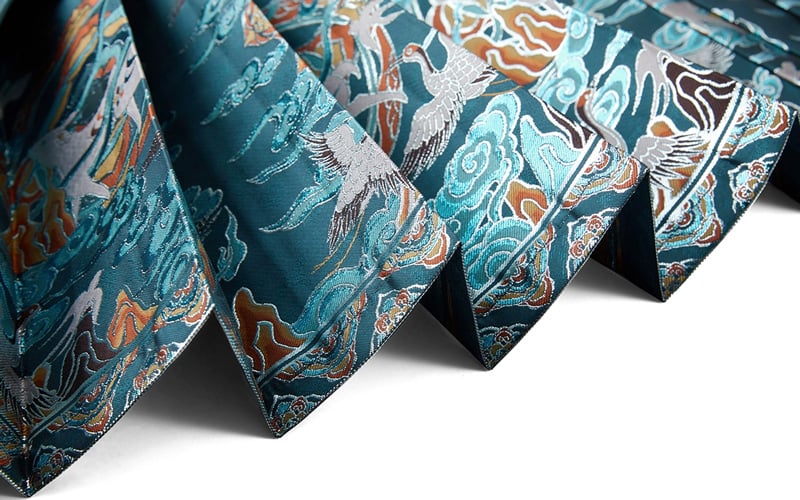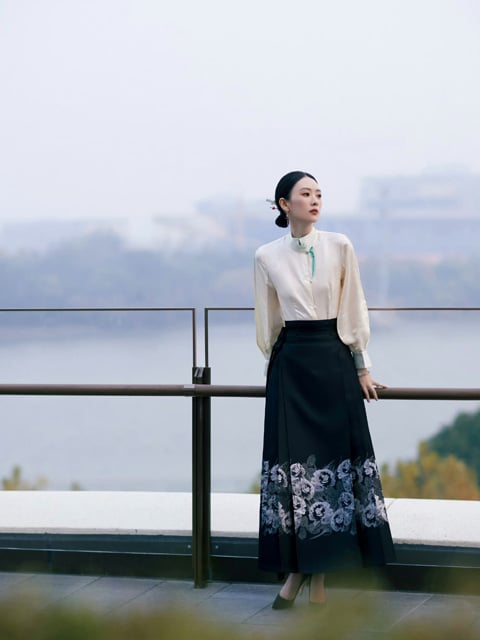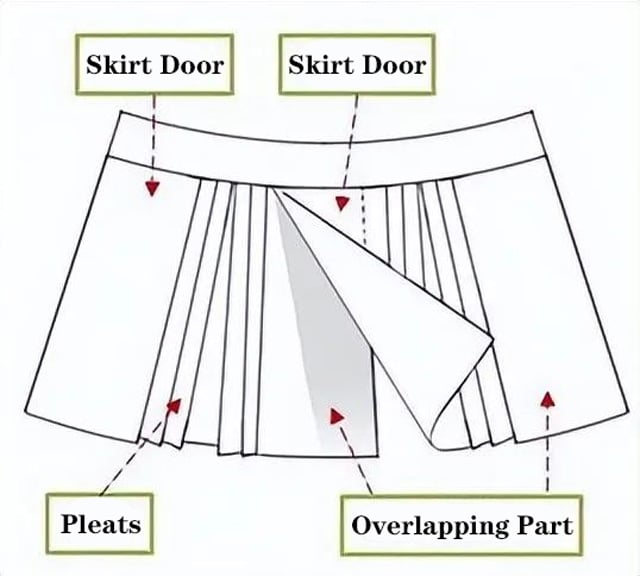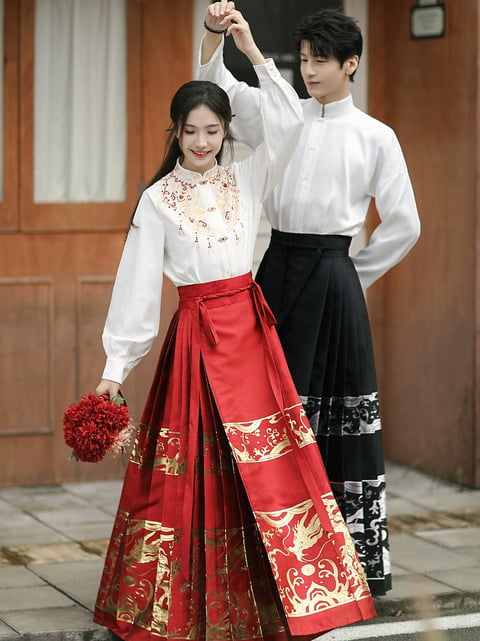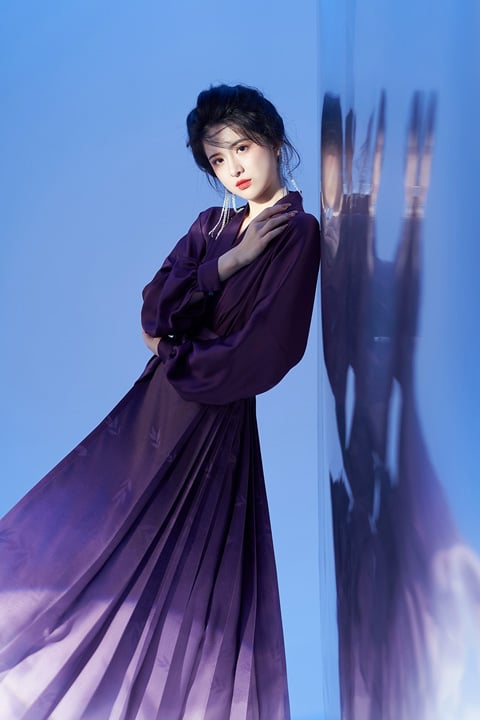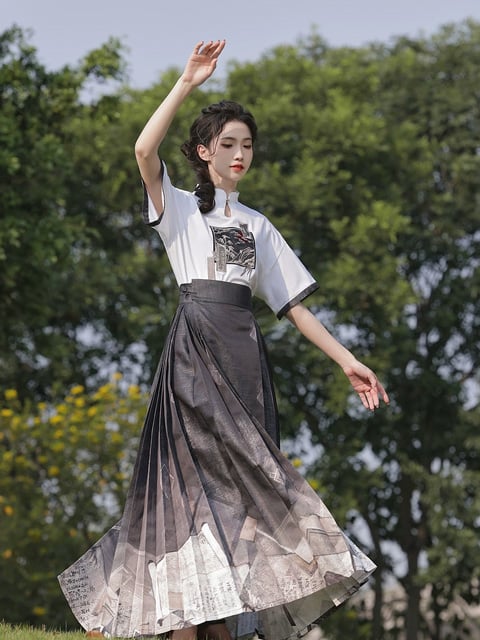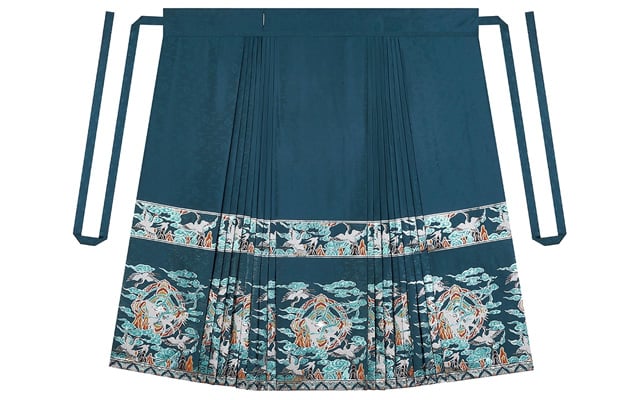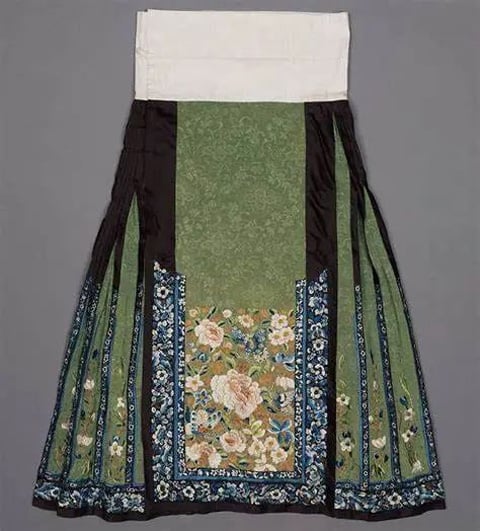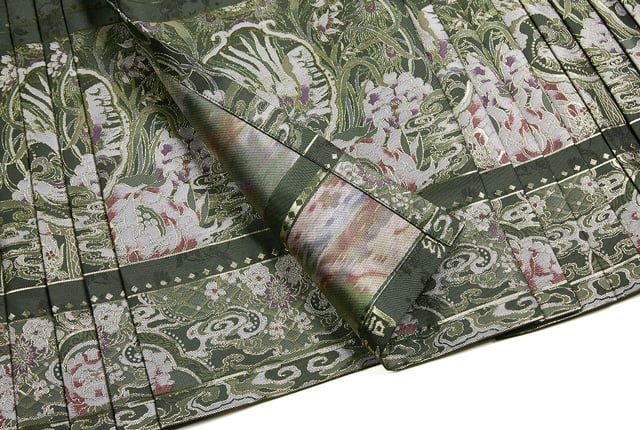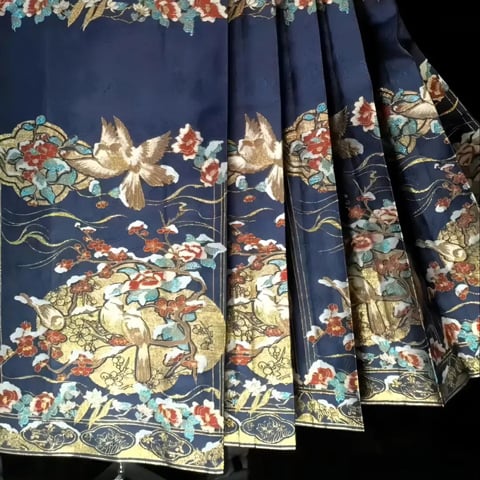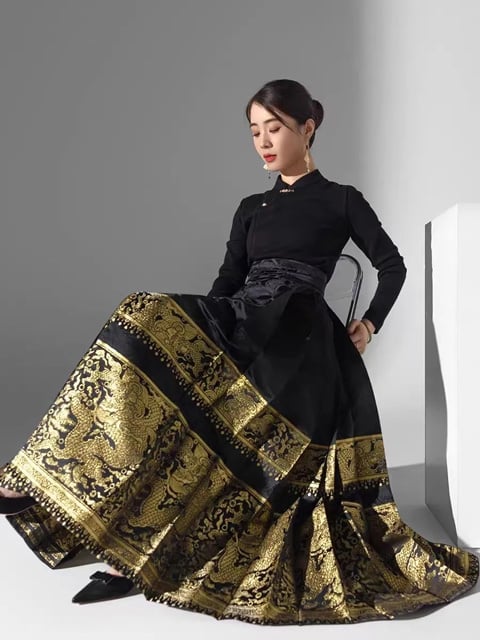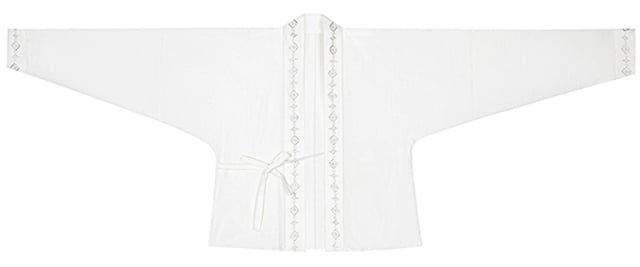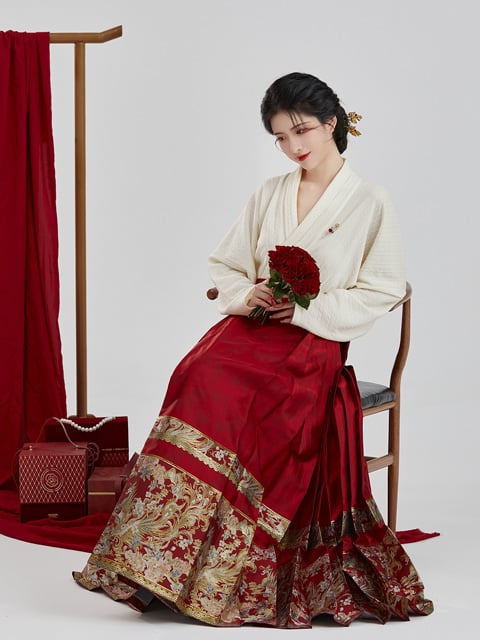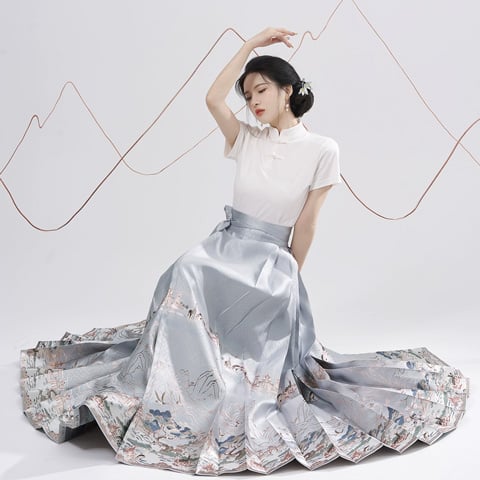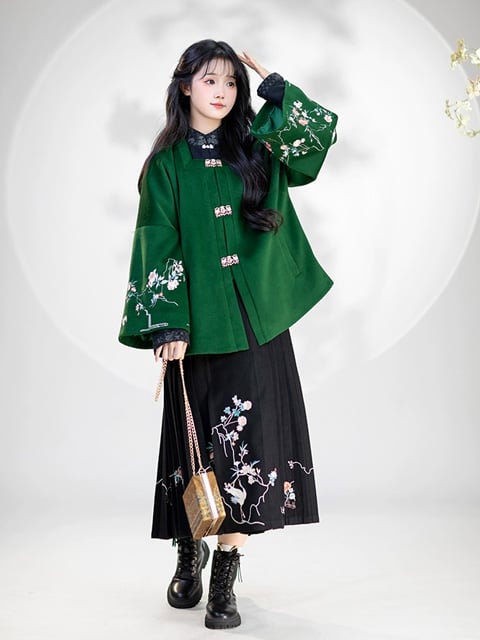Recently, the popularity of Mamian Qun (horse face skirt) shows no sign of waning. On November 23rd, at the opening night of VOGUE Forces of Fashion, Tong Yao's appearance in a Mamian Qun caught the attention of netizens.
Mamian Qun are gradually integrating into our vision and lives. In light of this trend, I believe many people are eagerly longing to own a horse-face skirt, so let us follow the Hanfu Shidai explore the details to consider when selecting and styling a horse face skirt.
I. Selection Stage
Step 1: Size
First and foremost, a suitable size that fits and contours to the body curves is crucial for a perfect outfit. Similar to a suit, one can choose to follow the size chart or opt for made-to-measure when selecting a Mamian Qun.
Whether based on the size chart or personalized tailoring, the primary measurements to consider are height, waist circumference, and hip circumference. These factors will influence the choice of skirt length, waist length, and hem circumference.
If we choose to purchase online, merchants often provide a size chart for customers to make their selection. By referring to the table, one can choose accordingly based on their own size information.
If one chooses customization, they can provide their waist circumference, hip circumference, and height information to the merchant as a reference, and then consult with the tailor to determine the skirt door (a Mamian Qun is a total of four flat and straight panels are known as skirt door) width, waist length, and skirt length according to their personal needs.
In general, the skirt door width does not necessarily have a linear relationship with the waist circumference. Its width can range from 16-38 centimeters or 20-27 centimeters. As for the waist length, it can be calculated using a simple formula: waist length = net waist circumference + ease (generally 4-8 cm) + one skirt door width.
Regarding the skirt length, generally speaking, a Mamian Qun looks better when it touches the ground. Therefore, one can determine the skirt length based on their height, combined with the proportion of the upper and lower body. It is worth noting that if the waist of the Mamian Qun is too large, it will obscure some pleats, while if it is too small, it may easily expose one's body. Furthermore, an inaccurate hip measurement can also affect the overall effect of the Mamian Qun. Therefore, compared to selecting a standard size, choosing a customized Mamian Qun is a more secure option.
Step 2: Pleats
After determining the basic size, the design of pleats will further impact the visual effect of the Mamian Qun. Regular Mamian Qun commonly have five or seven sets of pleats. If the distance between the left and right hips is wider, one can choose seven sets of pleats.
In addition, Mamian Qun can have parallel pleats or trapezoidal pleats. Parallel pleats present an "H" shape visual effect, while trapezoidal pleats make the skirt hem appear more relaxed.
Step 3: Fabric
The fabric of a Mamian Qun can be divided into: satin, chiffon, silk, and synthetic fibers, among others. At the same time, the length of the fabric will determine the hem circumference. The width of the fabric is used as the base to determine the size of the skirt hem. Here, two concepts are involved - "Bai (摆, hem)" and "Ding (定)."
"Bai" refers to the circumference of the entire Mamian Qun when unfolded, while "Ding" refers to the length of a repeated pattern. The standard length of Ding is generally 1.2-1.5 meters, so a 4.5-meter hem is a Mamian Qun with three Ding. Additionally, there is also a 6-meter hem Mamian Qun, which has four Ding. These two lengths are the most common skirt hem sizes.
Step 4: Craftsmanship
Apart from the overall effect, different craftsmanship techniques on the skirt surface can subtly alter the temperament of the entire dress.
The first type is embroidery. Typically, embroidered patterns are presented on the skirt surface. Mamian Qun in the style of the Qing Dynasty generally pay more attention to this aspect, with intricately embroidered patterns on the skirt front.
The second type is imitation Zhuanghua. "Zhuanghua (妆花)" are the most complex variety of weaving techniques in Nanjing Yunjin. Mamian Qun with imitation Zhuanghua patterns are rich in design and have a diverse color palette.
The third type is imitation Zhijin (woven gold). As the name suggests, woven gold involves weaving patterns using gold threads. Compared to imitation Zhuanghua, the patterns of imitation woven gold are relatively monochromatic. Depending on the type of gold thread, it can be classified as Bian Jin (扁金, flat gold), Yuan Jin (圆金, round gold), or Bao Jin (包金, wrapped gold).
Bian Jin, being the most common type, forms many refractive surfaces due to its flat shape, giving the pattern a lustrous appearance. However, flat gold threads are prone to flipping. It is worth emphasizing that the flipping of gold threads is not a flaw but rather a normal phenomenon. Compared to flat gold, round gold is less likely to flip, and its higher glossiness will reveal a hazy sandy texture. Wrapped gold has a longer color retention time and better color glossiness.
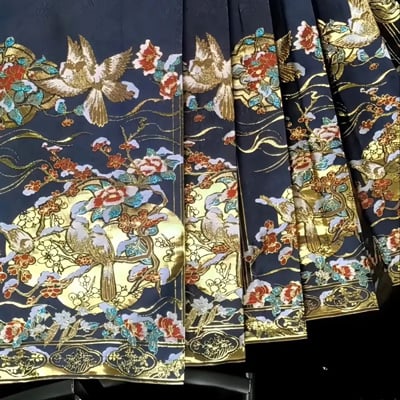
Observant individuals may notice that we mentioned "imitation" Zhuanghua and Zhijin. This is because makeup flowers and woven gold, as precious traditional handicrafts in ancient China, are difficult to be replicated in large quantities with fine details by machines in a short period of time. Therefore, the craftsmanship of Mamian Qun available on the market usually imitates crafts.
Step 5: Qun Lan
Lastly, let us discuss the Qun Lan (裙襕), refers to the horizontal pattern on the hem of a Mamian Qun. Generally, the Qun Lan of a Mamian Qun is divided into the knee hem and the bottom hem. As the name suggests, the knee hem refers to the pattern near the knee area of the skirt, while the bottom hem refers to the pattern near the foot.
II. Mamian Qun Pairing
Nowadays, the most common and classic item to pair with a Mamian Qun is none other than the airplane sleeve shirt, originates from the fact that this type of top gradually narrows from the shoulder to the cuff, resembling the shape of an airplane when laid flat. In reality, it generally refers to the Song-style short shirt.
One important reason for choosing the airplane sleeve shirt to pair with a Mamian Qun is its corss collar design, which adds a touch of elegance to the overall look. On the other hand, the narrow cuff avoids any cumbersome feeling and does not hinder our daily movements, giving off a sleek appearance. However, for some individuals with smaller frames, the lapel design may lead to exposure. In that case, one can choose a Song-style strapless top as an inner layer.
In fact, besides the airplane sleeve shirt, we can also see many creative pairings in daily life. For example, a shirt, a hoodie, or a stand-up collar top, all of these can enhance the beauty of the Mamian Qun in different ways. Of course, as the weather gets colder, one can choose a round-neck diagonal jacket, a Song-style long jacket, or a woolen coat for pairing.
Through the above introduction, we can see that there are many considerations and techniques when selecting a Mamian Qun. In the actual selection process, we need to consider multiple factors, including color and suitable occasions.
In fact, besides the airplane sleeve shirt, we can also see many creative pairings in daily life. For example, a shirt, a hoodie, or a stand-up collar top, all of these can enhance the beauty of the Mamian Qun in different ways. Of course, as the weather gets colder, one can choose a round-neck diagonal jacket, a Song-style long jacket, or a woolen coat for pairing.
Through the above introduction, we can see that there are many considerations and techniques when selecting a Mamian Qun. In the actual selection process, we need to consider multiple factors, including color and suitable occasions.
